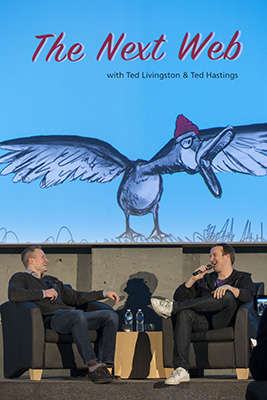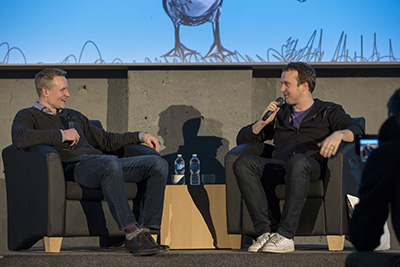Listen to the full conversation:
“What is it about Waterloo that has you located here, still?”
The question came halfway through an hour-long fireside chat between two giants in the Canadian tech scene. Ted Hastings, founder of Rebellion Media and President of Perk, was interviewing Ted Livingston, co-founder and CEO of Kik Interactive, about life as the leader of Waterloo Region’s latest unicorn. The event was part of Waterloo Hacks, the region’s latest hackathon, which gives high-performing tech students from the University of Waterloo and Laurier an opportunity to show their skills to big-name employers like Google, Manulife, Canadian Tire, Thomson Reuters and others

Communitech Photo: Meghan Thompson
As he had with Mike Kirkup back in October, Livingston regaled the crowd with tales from the startup front lines: strolling into his local branch to ask an unsuspecting teller for a million-dollar bank draft; playing hardball with investors like Fred Wilson in New York; and getting sued by BlackBerry, the largest and most successful company in Waterloo’s history.
But when asked why he stayed in Waterloo, Livingston hesitated for the first time all evening,
“I want to turn this question around on you,” he replied. “You’ve been here longer.”
It’s true. Compared to Livingston, Hastings is a relative pioneer of Waterloo Region tech. A Laurier ’97 grad, Hastings started building high-growth businesses when Livingston was still in high school.
Hastings spoke of how he dodged the dot-com bust and weathered the storm from safety in Canada while San Jose “went into the toilet at that point in time,” and described how during that period he was able to raise “about $250 to $300 million, all out of the U.S.” as a Canadian entrepreneur. But despite his success, Hastings always faced calls to move operations south of the border.
“Ten years ago, it was more prevalent. People saying, ‘OK, you need to be in the Valley.’ For us it was also Boston, or somewhere else other than ‘wherever you are in your igloo.’”
“Yep,” seconded Livingston, nodding. “Mennonite country.”
Hastings’ solution to the problem is surprising in its simplicity: “You invest a lot of time with investors, bringing them through the town. This didn’t exist then,” he said, gesturing to the packed Tannery Event Centre, “so we would point to some companies. We drove investors around and said “there’s the Canadian dollar, the government kind of supports this, and some other tax credits…”

Communitech Photo: Meghan Thompson
“Is this before BlackBerry, right?” asked Livingston, now fully the interviewer.
“Oh, for sure,” replied Hastings, looking out at the crowd again. “This, obviously… it’s an easier sell… But for us, we stayed because it was amazing talent – in town – cost-effective access to that talent that exists here, and the government support.”
“I think that’s exactly right,” replied Livingston nodding. “Especially as a consumer company we get tons of pressure… ‘Go to the Valley, where Pinterest, Facebook, Google, Twitter and everybody else is.’ I just have this feeling that Waterloo is on the cusp of greatness. The reason I have that feeling is the co-op program. If you’re here, you don’t appreciate how special it is. It’s only when you get out there and start talking to investors, people at companies, and they know Waterloo because it’s the number 1 place they get talent.
“Today, the problem is, when people graduate, everybody leaves. They go to Facebook, Google, all these things. I’m making a bet that over time, I can be – we can be – upstream from all those guys. And if we put enough in place, build enough cool things here in town, we can convince people to stay. If I can be on the ground floor of that, that will be a killer advantage.”
“I think you’re right about that,” Hastings replied, with a smile.

